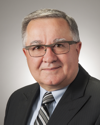
Assessing international engineering qualifications is a challenge
July 13, 2016
By
CCE

Robert (Bob) McDonald. Image: APEGS.
The Regina Leader-Post interviewed Bob McDonald, P.Eng., the new executive director and registrar of the Association of Professional Engineers and Geoscientists of Saskatchewan, on July 4.
McDonald, who is an engineer and a lawyer, was previously the deputy registrar of APEGS and has 17 years’ experience with the association.
The interview covered the important role that engineers and geoscientists play in the Saskatchewan economy, and also on how professional regulation has evolved, particularly with international applications.
Following is a short extract from the interview:
Q: Anecdotally, we hear about foreign graduates with engineering degrees driving cabs and doing other service industry jobs. Is that because they’re not qualified to work here or the accreditation process is too rigid?
McDonald: “We have an accreditation process in Canada that’s fairly robust and engineering education in Canada is very strong. There are a lot of universities around the world that we don’t know much about and that creates some difficulty in dealing with internationally educated graduates. Is it an engineering degree or a science degree? Is it a technology degree or an engineering degree? You have to look at various approaches to assess those qualifications. (Some say), let’s have everybody write an exam. But to a mid-career or late-career professional coming to Canada, is that a fair assessment of that person’s qualifications? To have a person write six or eight or 10 or 12 exams, it does make it a difficult process, particularly when (the exam) is in a second or third language. If you get into this under-employment situation, it affects one’s self esteem. You also get skill atrophy because you’re not allowed to use your skills. Then your family is living below the standard of living they should be living at based on their qualifications. There’s a cost to the country of not having these people fully employed.”
To read the full interview by Bruce Johnstone, and to watch a video, click here.